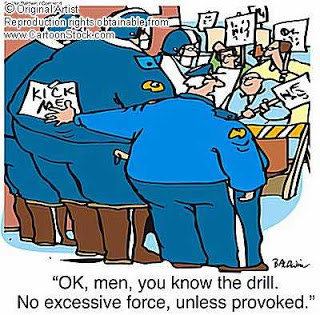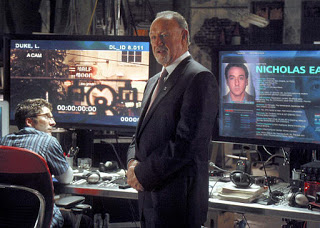Jury Rights Day

“How does it become a man to behave toward this American government today?” wrote Henry David Thoreau in 1849. “I answer that he cannot without disgrace be associated with it.”
Thoreau’s assessment was inspired by his disgust over Washington’s war of aggression against Mexico, and — what was much the same thing — the entrenchment and expansion of chattel slavery.
He would almost certainly reach the same conclusion regarding the proper relationship between people who cherish justice and the ever-growing malignancy we could call the Homeland Security State. Thoreau’s comments about the servility on which the State depends have likewise been vindicated by time.
“The mass of men serve the state … not as men mainly, but as machines, with their bodies,” he lamented. “In most cases there is no free exercise whatever of the judgment or of the moral sense; but they put themselves on a level with wood and earth and stones; and wooden men can perhaps be manufactured that will serve the purpose as well.”
Thoreau allowed that there are a handful of people –“heroes, patriots, martyrs, reformers in the great sense, and men” — who distinguish themselves by serving the government “with their consciences,” which unavoidably means that they “necessarily resist it for the most part; and they are commonly treated as enemies by it.”
Although he declared “war with the State, after my fashion,” Thoreau was not a pure anarchist, explaining that where it was possible and compatible with his principles he would “still make use and get what advantages of her I can….”
One form of association with the State that liberty activists should embrace and should exploit — without fear of disgrace — is jury duty.
“Under a government which imprisons unjustly, the true place for a just man is also a prison,” insisted Thoreau in one of the numerous radiant epigrams adorning his masterful essay. As a matter of lamentable history, he’s right. But as a matter of principle, the true place for just people in such circumstances is the jury box, where they will interpose themselves between the State and its innocent victims. This principle was elucidated in compelling detail by Thoreau’s fellow abolitionist Lysander Spooner.
The fact that juries possess plenary power to judge both facts and law — the latter giving a jury the power to nullify the enforcement of bad laws — is perhaps the most carefully guarded secret of our current legal system. For the first century of our existence, it was commonplace for juries to be informed of that fact before being sent to deliberate. Today, a defense attorney who mentions that fact in open court can often expect to be censured by the presiding judge or even hit with a contempt-of-court charge.
Rescuing this fundamental check on government power is the mission of the Fully Informed Jury Association, which commemorates this date (September 5) as “Jury Rights Day.” This observance is held in remembrance of the 1670 acquittal — through jury nullification — of Quaker leader William Penn on the charge of preaching an “illegal” sermon in London. The heroic holdout jurors, led by Edward Bushell, were imprisoned and tortured by the presiding judge (through what today’s practitioners would call a “restricted diet” — others call it deliberate starvation and dehydration), and set free when England’s highest court upheld the right of jury nullification.

One very telling measure of the Regime’s fear of jury nullification is found in the efforts expended by prosecutors — who have become a veritable human pestilence — to prevent cases from going to trial.
Dr. Paul Craig Roberts, who masterfully dissected the contemporary “justice” system in his 1998 book (co-written with Lawrence M. Stratton) The Tyranny of Good Intentions, points out that “the vast majority of felony cases are settled with a plea bargain….”
Most conservatives made aware of this would react with a snort and complain about excessive leniency, ignorant of another important fact: Many, perhaps most, “felonies” today involve no offenses against persons or property, no criminal intent, and are usually a product of an opportunistic prosecutor’s malicious creativity in confecting a criminal offense.
It is common for prosecutors to multiply charges as a way of terrorizing an innocent defendant into accepting a plea. Very rarely do we see a defendant with the means to defend himself in such circumstances. An exception that proves the rule is the wealthy Republican Senator Larry Craig, who was manipulated into a guilty plea on a ridiculous charge, and has tardily decided to put up a fight.
But for the average citizen who finds himself targeted by an ambitious prosecutor, a plea bargain usually seems like the only relatively palatable alternative to the expense of a trial and the possibility of a long time in prison. At the bargaining table, “I’m all in” for the prosecutor means that, should he lose, he would sacrifice a little prestige, with the taxpayers absorbing all of the expenses; the defendant stands to lose everything and faces the prospect of utter ruin.
This is why so many innocent people are willing to deal. For the State, the most attractive feature of such arrangements is the fact that it keeps such cases away from juries. And we’re left with a “justice” apparatus that functions, in the words of legal scholar John Langbein, like “the ancient system of judicial torture,” which relied on self-incrimination through duress, rather than conviction on the basis of sound evidence.
The ardent desire of our rulers to minimize the jury system — with the ultimate objective of abolishing it — underscores the importance of rehabilitating the only government institution worthy of unqualified support: The fully-informed citizen jury.
Video bonus
The following three-part program, produced roughly two decades ago, offers additional background and insights regarding the need for, and critical importance of, jury nullification as a check on government power:
Part One:
Part Two:
Part Three
Be sure to visit The Right Source and the Liberty Minute Archive.
Content retrieved from: http://freedominourtime.blogspot.com/2007/09/jury-rights-day.html.



























